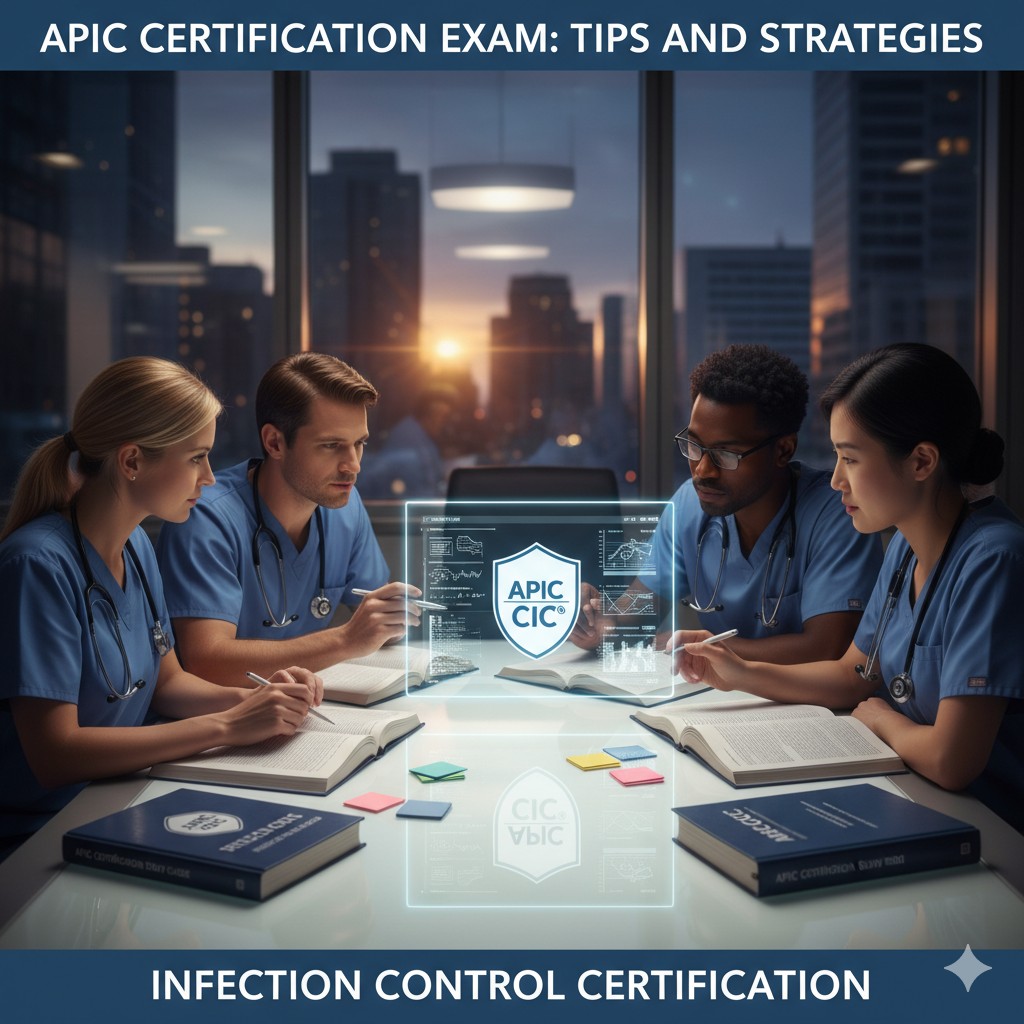How do I prepare for the APIC certification exam?
Preparing for the APIC Certification Exam: Tips and Strategies
The APIC certification exam, specifically the Certification in Infection Control (CIC), is widely recognized as the gold standard for infection preventionists (IPs) and other healthcare professionals dedicated to safeguarding patient health. Achieving the CIC credential signifies a high level of competency, demonstrating mastery of the core body of knowledge and best practices in infection prevention and epidemiology. It’s more than just a title; it’s a commitment to excellence that directly contributes to improved patient outcomes and a safer healthcare environment.
Earning the CIC is a powerful catalyst for career advancement, boosting professional credibility, and opening doors to leadership opportunities within the infection prevention field. It validates your expertise, assuring employers, colleagues, and patients that you possess the rigorous knowledge required to effectively manage complex infection control challenges. While the process of preparing for the CIC exam prep can seem daunting, with the right resources, a structured strategy, and dedicated effort, success is well within reach. This article provides a comprehensive guide to navigating your preparation journey and achieving your infection control certification.
What Are the Recommended Study Resources for the APIC Certification Exam (CIC)?
Success on the APIC certification exam begins with leveraging the most authoritative and up-to-date resources. Your study materials should align with the core competencies outlined by the Certification Board of Infection Control and Epidemiology (CBIC).
The single most comprehensive resource is the APIC Text Online. This is the foundational body of knowledge for infection prevention and control, covering everything from basic microbiology to complex epidemiological investigations. Complementing this, you must consult key regulatory and guidance documents, including the latest CDC guidelines (such as the Healthcare Infection Control Practices Advisory Committee—HICPAC), the Centers for Medicare & Medicaid Services (CMS) rules, and relevant WHO materials on global health and safety.
For a focused review, the APIC Certification Study Guide is an invaluable tool. It distills the vast amount of information into a digestible format, often organized by the exam's content domains, and provides practice questions to check your understanding. While the APIC study guides are essential, consider supplementing your preparation with other resources like review books published by reputable experts in the field.
To facilitate memorization and on-the-go studying, integrate flashcards (digital or physical), dedicated mobile apps with question banks, and APIC practice tools into your routine. Finally, joining or forming study groups—either locally through an APIC local chapter or online—can provide mutual support, diverse perspectives, and accountability, making challenging concepts easier to grasp.
How Can the APIC Learning System Help Me Prepare for the Certification Exam?
The APIC Learning System is specifically designed to prepare candidates for the CIC exam and is one of the most effective tools for structured study. It offers a comprehensive, evidence-based curriculum that is meticulously aligned with the official CIC exam content outline, making it a targeted and efficient way to cover the necessary material.
The system is structured into self-paced modules, allowing you to work through the material according to your own schedule and pace. These modules incorporate a variety of learning aids, including detailed text, interactive tools, engaging videos, and real-world case studies that apply infection control principles to complex scenarios. This approach helps you move beyond simple memorization to truly understanding and applying the concepts.
A significant benefit of the Learning System is the inclusion of numerous practice questions at the end of each module and comprehensive practice tests. These questions simulate the style and difficulty of the actual CIC exam, helping you become comfortable with the format and identify specific areas where you need more review.
To get the most out of it, integrate the Learning System into a study schedule by dedicating specific time blocks each week to complete modules. Don't just read the material; actively work through the case studies and thoroughly review the rationale for both correct and incorrect answers on the practice questions. This active engagement is key to transforming knowledge into applicable expertise.
What Is the Format and Content Outline of the APIC Certification Exam?
To study effectively, you must understand what you are preparing for. The APIC certification exam for the CIC credential is a computer-based, multiple-choice test. Candidates are given three hours to complete the exam, which consists of 150 questions. Importantly, only 135 of these questions are scored; the remaining 15 are pre-test items used for future exam development and don't count toward your final score.
The content of the exam is divided into several domains, reflecting the varied responsibilities of a professional infection preventionist. You must prioritize your study time based on the weight of these sections. The core CIC exam content areas are:
Identification of Infectious Disease Processes: Understanding the epidemiology, microbiology, and clinical presentation of infectious agents (approximately 23% of the exam).
Surveillance and Epidemiologic Investigation: Executing surveillance systems, outbreak investigation, and data analysis (approximately 22% of the exam).
Preventing and Controlling the Transmission of Infectious Agents: Applying evidence-based practices for prevention, disinfection, sterilization, and environmental control (approximately 20% of the exam).
Management and Communication: Leading infection control programs, policy development, risk assessment, and effective communication with various stakeholders (approximately 11% of the exam).
Education and Research: Developing and implementing educational programs, and interpreting and applying infection prevention research (approximately 9% of the exam).
Employee/Occupational Health: Protecting healthcare personnel from infectious hazards and managing exposures (approximately 8% of the exam).
Cleaning, Disinfection, and Sterilization: Ensuring proper methods and procedures for medical devices and equipment (approximately 7% of the exam).
It is crucial to stress the importance of reviewing the official CIC Candidate Handbook published by the Certification Board of Infection Control and Epidemiology (CBIC). This document is the ultimate source of truth for the most current content outline, eligibility requirements, and testing policies.
Are There Practice Exams or Sample Questions Available for the APIC Certification?
Practice is essential for success on the APIC certification exam. Taking practice tests helps you not only assess your knowledge but also build endurance for the three-hour testing period.
The most recommended resource is the official APIC practice exams and question banks. These resources are often developed using the same content outline and question-writing standards as the actual exam, making them the closest simulation you can find. Using official CIC practice questions helps you become familiar with the level of detail and critical thinking required.
Beyond APIC's official tools, many reputable third-party exam prep platforms and study apps offer high-quality question banks. When evaluating these, ensure they are current and align their questions with the CBIC's content outline. Read reviews from past candidates to gauge their effectiveness.
The goal of a practice exam is not just to get a good score, but to identify weak areas. After completing a full-length practice test, spend time analyzing every question you got wrong and, just as importantly, questions you answered correctly but were unsure about. Use these results to direct your future study efforts, focusing your time on the domains and concepts that need the most work. Always simulate exam conditions by taking the practice test in a quiet environment, without interruptions, and adhering strictly to the time limit.
What Are Some Effective Strategies for Studying for the APIC Certification Exam?
Passing the CIC exam prep requires more than just accumulating knowledge; it demands strategic, disciplined study.
First, create a structured study plan. Depending on your experience level and current familiarity with the domains, a preparation period of three to six months is generally recommended. Break the content outline into manageable weekly chunks and schedule dedicated study time—and stick to it. Use a calendar to mark your progress and your target test date.
Next, employ effective learning techniques. Move beyond passive reading and embrace active recall (e.g., quizzing yourself without notes) and spaced repetition (reviewing material at increasing intervals). A particularly effective method for infection prevention is using case-based practice. Work through clinical vignettes or real-world scenarios, forcing yourself to apply guidelines and knowledge rather than simply memorizing facts.
For support and accountability, join APIC local chapters or online communities. Engaging with other IPs who are also studying or have recently passed the exam provides invaluable insights, motivation, and a platform for clarifying difficult concepts.
Finally, dedicate time to planning your test-day tips:
Manage Time Effectively: During the practice exams, learn to pace yourself. On test day, allocate your time carefully, spending no more than a minute or two on any single question.
Read Questions Carefully: The multiple-choice questions often include subtle but critical details. Read the entire question and all answer choices before selecting your response.
Eliminate Wrong Answers: Use the process of elimination. Even if you don't immediately know the correct answer, you can often narrow down the choices to two, significantly improving your odds.
Conclusion
Passing the APIC CIC exam is a significant professional achievement that solidifies your role as a leader in patient safety. This rigorous process demands the right blend of resources, structured preparation, and strategic study methods. By leveraging authoritative content like the APIC Text Online, committing to a program like the APIC Learning System, and integrating focused CIC practice questions into your routine, you can build the necessary foundation for success.
The journey to certification is a marathon, not a sprint. Remember to stay consistent with your study plan and be confident in the expertise you already possess. With dedication, discipline, and the effective use of these proven tools, you will be well-prepared to earn the prestigious Certification in Infection Control and make an even greater contribution to healthcare quality.













QualityCrusader
on October 05, 2025Highly recommend the **APIC Text Online**. It's the gold standard. This article correctly highlights it as the foundation for any serious **infection control certification** candidate.
Infection_Slayer
on October 05, 2025This article is a lifesaver! The breakdown of the **APIC Learning System** and the exam content areas is exactly what I needed to structure my **CIC exam prep**.